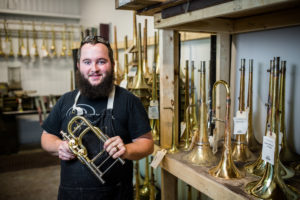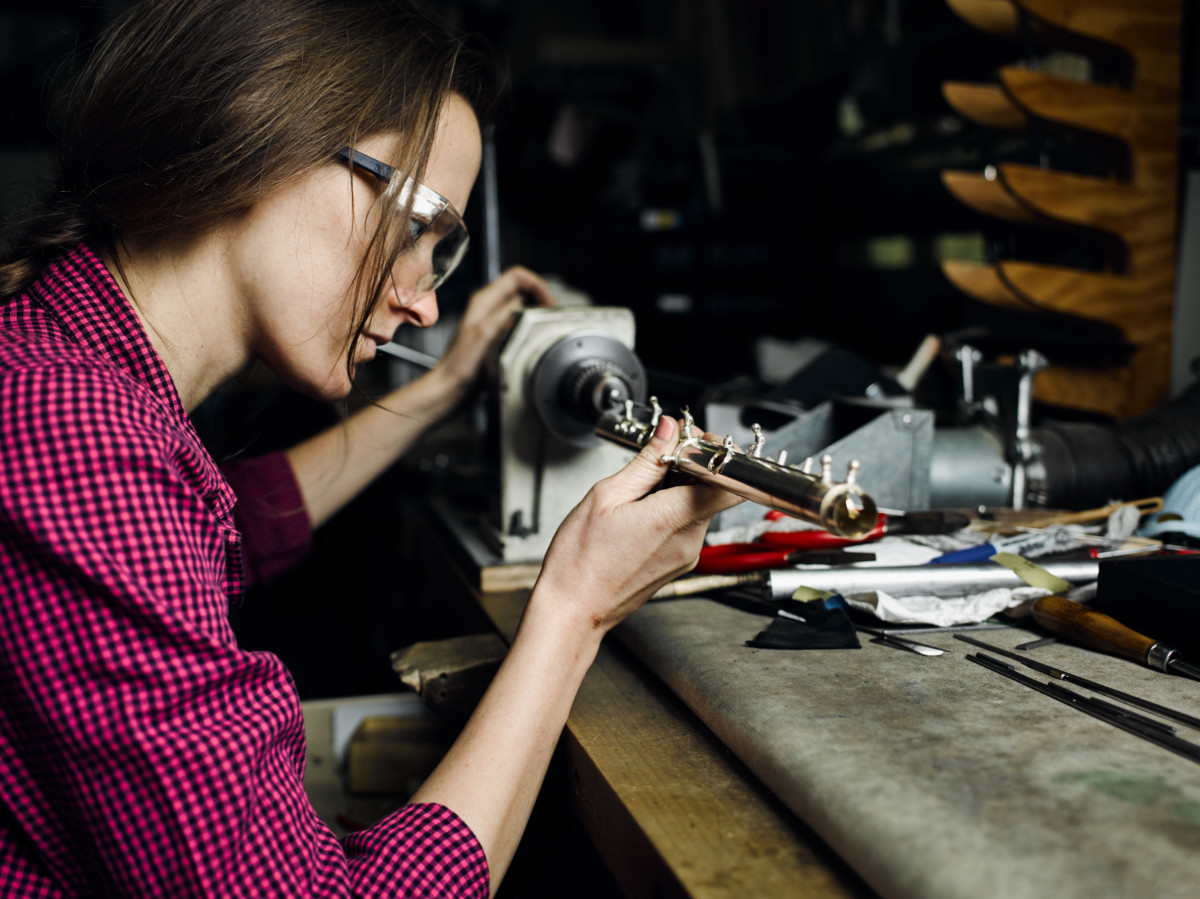Massachusetts is home to some of the oldest and most renown instrument makers in the country
You’ll find musicians at work in clubs, concert halls and conservatories. But in Massachusetts – home to noted makers of musical instruments – you can also find them on the factory floor.
Just ask Paul D. Chadbourne II, a craftsman at S.E. Shires Co., the Holliston manufacturer that’s produced trumpets and trombones since 1995.
“One of the things I love about working here is probably about 90 percent of the shop is a musician,” Chadbourne says. “You know the care that needs to be there is going into the instrument.”
Paul D. Chadbourne II, 27
Craftsman
S.E. Shires Co. in Holliston
Products: Trombones and trumpets
Level of education: Bachelor of music in tuba performance
Favorite band: “The Soul Rebels Brass Band, out of N’awlins.”
Average salary for his position*: $39,040
*Based on Bureau of Labor Statistics data
That kind of care for his own instrument is precisely what led Chadbourne to start tinkering while studying tuba performance at Rhode Island College. The only technician he trusted lived in New Jersey – a long way to haul his horn – so he set out to learn some repair skills himself, apprenticing at Rick’s Musical Instruments in Cumberland, R.I.
Options beyond playing & teaching
Classmates started tapping Chadbourne to work on their instruments, and before long he reached out to S.E. Shires, seeking another apprenticeship to hone his skills. They offered him a part-time job in the buffing room, and he’s since bounced from department to department, learning most steps in the production process. Today he builds valve sections for trombones, cutting brass tubing and soldering fixtures using a meticulous method that can take four to six hours.
“For me, it’s like a dream job,” Chadbourne says.
Yet it’s one he never thought to dream about growing up.
“I was brought up with the idea that there are only two professions in the music field: It’s either teaching or playing,” he recalls. “But there’s so much more that you can do. I never would have thought when I was in high school that I would be making instruments for some of the most highly regarded musicians in the world.”
Guitarist and vocalist, by night
Hannah Liuzzo – a product specialist at Verne Q. Powell Flutes in Maynard – echoes that idea.
“You don’t have to just set your sights on being famous or a performer,” she says. “You can be involved in the industry in a lot of different ways and make a living.”
Hannah Liuzzo, 28
Powell Sonaré Product Specialist
Verne Q. Powell Flutes in Maynard
Products: Flutes and piccolos
Education: Bachelor of arts in flute performance
Favorite artist: “Oh man, I would have to say Sufjan Stevens.”
Estimated salary based on Bureau of Labor Statistics data: $40,650
Average salary for her position*: $73,080
*Based on Bureau of Labor Statistics data
Hannah Liuzzo, 28
Powell Sonaré Product Specialist
Verne Q. Powell Flutes in Maynard
Products: Flutes and piccolos
Education: Bachelor of arts in flute performance
Favorite artist: “Oh man, I would have to say Sufjan Stevens.”
Estimated salary based on Bureau of Labor Statistics data: $40,650
Average salary for her position*: $73,080
*Based on Bureau of Labor Statistics data
Liuzzo is involved in the industry in multiple ways herself. By night, she performs at venues like Royale and Great Scott as a guitarist and vocalist in the Boston band Lilith.
But her first love was the flute. She majored in flute performance at the University of New Hampshire and was working a music teacher when she came across a job posting on Powell’s website while shopping for a new instrument. She started as a sales representative and now manages the Powell Sonaré brand, overseeing everything from marketing and product development to production, quality control and the supply chain.
“My favorite part is definitely being involved with the workshop – going upstairs and getting to learn about the handwork and really be a part of it happening,” Liuzzo says.
Making for the Boston Symphony
Fellow flutist Katharine Smith understands the appeal of the workshop firsthand. She earned a bachelor’s degree in music education but wasn’t sure if teaching was the right path, so she embarked on a year-long instrument repair program at a tech school in Minnesota. Now, as a body maker at Acton flute manufacturer Wm. S. Haynes Co., she tackles the earliest steps in the production process, working on raw metal tubes with both small bench tools and powerful machines.
Katharine Smith, 28
Body maker
Wm. S. Haynes Co. in Acton
Products: Flutes
Education: Bachelor of arts in music education and a year-long technical program in band instrument repair
Favorite band: “The Shins. I saw them last year in Boston, and It was so amazing.”
Estimated salary based on Bureau of Labor Statistics data: $40,650
Average salary for her position*: $39,040
*Based on Bureau of Labor Statistics data
Katharine Smith, 28
Body maker
Wm. S. Haynes Co. in Acton
Products: Flutes
Education: Bachelor of arts in music education and a year-long technical program in band instrument repair
Favorite band: “The Shins. I saw them last year in Boston, and It was so amazing.”
Estimated salary based on Bureau of Labor Statistics data: $40,650
Average salary for her position*: $39,040
*Based on Bureau of Labor Statistics data
“I really like working on machines,” Smith says. “You have to be very focused. It brings you into this state of mind where you’re really in the zone. I feel like I get my best work when I’m in that headspace.”
The bench work, meanwhile, is “kind of the same skill set as jewelry making.”
Indeed, the flutes are made with precious metals – silver, gold and even platinum – and the two brothers who founded the company, William and George Haynes, were originally jewelers. They built their first flute at the request of a member of the Boston Symphony in 1888, making Haynes the country’s oldest flute maker.
“It’s really cool to be a part of American history and music history,” Smith says.
Starting in the basement
SJC Custom Drums in Southbridge was also founded by a pair of brothers – a lot more recently. Scott and Mike Ciprari started building drums in 2000 as teenagers working out of their grandmother’s basement. After high school, Mike went on tour with his band No Trigger, bringing the drum kit Scott had built for him on the road (and drumming up business).
Mike Ciprari, 33
Cofounder
SJC Custom Drums in Southbridge
Products: Drum kits, snares, hardware and accessories
Education: A year and a half of college
Favorite band: “311. Everyone makes fun of me for it, but Chad Sexton is the drummer for it, and he’s the reason I wanted to play the drums in the first place. I love that band so much.”
Average salary for his position*: $128,020
*Based on Bureau of Labor Statistics data
Mike Ciprari, 33
Cofounder
SJC Custom Drums in Southbridge
Products: Drum kits, snares, hardware and accessories
Education: A year and a half of college
Favorite band: “311. Everyone makes fun of me for it, but Chad Sexton is the drummer for it, and he’s the reason I wanted to play the drums in the first place. I love that band so much.”
Average salary for his position*: $128,020
*Based on Bureau of Labor Statistics data
“Just by me being out there, kind of as a traveling salesman on the band’s dime, I met a ton of drummers that were interested in what we were doing,” Mike Ciprari says.
Today, they’ve definitely outgrown the basement – SJC recently moved to a new 60,000-square-foot HQ – and their roster of drummers includes big names like Tré Cool of Green Day, Josh Dun of Twenty One Pilots and Matt and Kim’s Kim Schifino.
“My favorite part is working with the artists, designing custom kits for a band I’m a fan of and then seeing that drum set on tour or on a record or on TV,” Ciprari says.
Those custom creations can be quite elaborate – say, a snare made from whiskey barrels for the Zac Brown Band, or a light-up drum kit for local pop rockers Boys Like Girls – but they’re all produced by a lean crew of six people, some of whom, Ciprari notes, had no prior manufacturing experience.
No experience required
Indeed, the pros we spoke to emphasized that if you’re interested in learning to make instruments, opportunities are out there.
“At Powell, we actually hire all the time for people doing handwork,” Liuzzo says. “We like to train people from the ground up, because we want them to do it the Powell way. If you have any handwork experience at all – if you’ve done jewelry, fixing your bicycle, anything like that – as long as you have a good attitude and you’re committed, they’ll train you.”
Ciprari agrees. “We’ve got a couple of guys that were interns that weren’t even in tech or trade school. They were just like ‘I want to learn. I want to be around this company and learn the industry.’ They’re back there now operating our CNC machine,” he says. “If you’re passionate about something, follow it.” ◾






